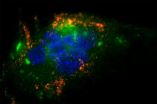(Press-News.org) In the 1990s advance care planning (ACP) developed as an alternative to the traditional approach to creating advance directives. In contrast to the traditional approach, the ACP concept views advance health care planning as a lifelong communication process. All persons in a target group are actively offered professional facilitation. Furthermore, the relevant institutions and professionals are involved and receive regular training and updates. They thus assume responsibility for ensuring that newly written advance directives are relevant, valid, available when needed, and honored reliably. In an article published in the latest issue of Deutsches Ärzteblatt International (Dtsch Arztebl Int 2014; 111 (4): 50–57), Jürgen in der Schmitten and his co-authors describe the advantages of ACP over the traditional approach to creating advance directives.
They compared the data of 136 residents of three intervention nursing homes with those of 439 residents of ten control nursing homes. Over the course of the 16.5-month observation period, 49 (36%) of the participants in the intervention nursing homes completed new advance directives, compared with only 18 (4.1%) in the control nursing homes. A far higher proportion of the newly written directives in the intervention region were signed by a physician and provided clear instructions on how to proceed in an emergency.
The authors conclude that implementation of an ACP program in German nursing homes leads to much higher numbers of effective advance directives than has previously been the case. Classic advance directives, in contrast, are seldom to hand when needed, rarely relevant, of dubious validity, and are often disregarded by medical staff. Jürgen in der Schmitten and his co-authors urge greater attention to ACP and recommend further research.
INFORMATION:
http://www.aerzteblatt.de/pdf.asp?id=152957
Implementing an advance care planning program in German nursing homes
2014-02-11
ELSE PRESS RELEASES FROM THIS DATE:
A breast cancer drug to fight fungal disease?
2014-02-11
The drug tamoxifen appears to kill a fungus associated with a deadly brain infection that afflicts HIV/AIDS patients, according to a University of Rochester study published online today by mBio, the journal of the American Society for Microbiology.
The findings, by Damian J. Krysan, M.D., Ph.D., associate professor of Pediatrics and Microbiology and Immunology at the UR School of Medicine and Dentistry, point to an example of Rochester researchers looking to repurpose older drugs by discovering new applications for secondary properties of the drug. In this case, investigators ...
A new postal code for cancer
2014-02-11
This news release is available in German.
Scientists have discovered that a polymer can provide a key to get into tumors: Prof. Prasad Shastri, Director of the Institute of Macromolecular Chemistry and core member of the cluster of excellence BIOSS Centre for Biological Signalling Studies at the University of Freiburg, and graduate students Julia Voigt and Jon Christensen have developed a new paradigm to home nanoparticles, containers that measure a few 100 nanometers in size, to endothelial cells. Using just charged polymers with the right affinity for cell lipids ...
Urban bees using plastic to build hives
2014-02-11
Once the snow melts, Canada's bee population will be back in business -- pollinating, making honey and keeping busy doing bee things. For at least two urban bee species, that means making nests out of plastic waste.
A new study by a University of Guelph graduate and a U of G scientist reveals that some bees use bits of plastic bags and plastic building materials to construct their nests. The research was published recently in the journal Ecosphere.
It's an important discovery because it shows bees' resourcefulness and flexibility in adapting to a human-dominated world, ...
MIT robot may accelerate trials for stroke medications
2014-02-11
The development of drugs to treat acute stroke or aid in stroke recovery is a multibillion-dollar endeavor that only rarely pays off in the form of government-approved pharmaceuticals. Drug companies spend years testing safety and dosage in the clinic, only to find in Phase III clinical efficacy trials that target compounds have little to no benefit. The lengthy process is inefficient, costly, and discouraging, says Hermano Igo Krebs, a principal research scientist in MIT's Department of Mechanical Engineering.
"Most drug studies failed and some companies are getting ...
First observation of a human HAT, key proteins in numerous pathologies
2014-02-11
The researcher Manuel Palacín, head of the Heterogenic and Multigenic Diseases lab at the Institute for Research in Biomedicine (IRB), in Barcelona, is among the world's experts in HATs (heteromeric amino acid transporters).
In humans, there are eight HAT molecules. These are associated, for example, with the following: rare diseases called aminoacidurias, such as lysinuric protein intolerance and cystinuria; the development of infections caused by the Kaposi sarcoma virus; various types of cancer; and relapse in cocaine use. HATs are, as the name implies, amino acid ...
Rare cancers: the challenge of accurate diagnosis -- press release
2014-02-11
Brussels, Belgium, 11 February 2014 -- Inaccurate diagnosis is a major obstacle for the proper treatment of patients with rare cancers. A Consensus on Improving the Pathologic Diagnosis of Rare Cancers was presented today by RARE CANCERS EUROPE, together with the European Society for Medical Oncology (ESMO) and the European Society of Pathology (ESP) in Brussels. The recommendations aim to help rare cancer patients get a timely and accurate diagnosis.
The statement is the result of a two-day workshop, where the particular challenges for each type of rare cancer(1) were ...
Could statins be used to fight a deadly viral infection?
2014-02-11
Two Perelman School of Medicine microbiologists may have found a way to use statins, the well-known blockbuster cholesterol-lowering drugs, to fight the hantavirus, a mysterious and lethal microorganism that appeared suddenly in the US southwest over 20 years ago. That first outbreak led to the deaths of more than a dozen people, most of them in their prime. The last reported outbreak happened in Yellowstone Park in 2012.
Only about 30 known human cases of hantavirus are reported in the US each year. The respiratory syndrome caused by a hantavirus infection comes from ...
Hacking the environment: bringing biodiversity hardware into the open
2014-02-11
New technologies are changing the way we collect biodiversity data. Data that once required taking expensive, bulky and fragile equipment on field trips can now be collected on cheap, compact and robust devices. In a recent paper in the Biodiversity Data Journal the construction of an environmental data-logger using the Arduino platform is described. It is hoped that this work will encourage the adoption of new data collection technologies by biodiversity scientists and foster new collaborations with both electronics hobbyists and electronics engineers who have an interest ...
Exon skipping prevents formation of toxic protein fragments in Huntington's disease
2014-02-11
New Rochelle, NY, February 11, 2014—An innovative therapeutic strategy for reducing the levels of toxic protein fragments associated with Huntington's disease uses a new approach called exon skipping to remove the disease-causing component of the essential protein, huntingtin. Proof of concept using antisense oligonucleotides to "skip over" the specific exon in a mouse model of Huntington's disease is reported in an article in Nucleic Acid Therapeutics, a peer-reviewed journal from Mary Ann Liebert, Inc., publishers. The article, part of a special focus issue on exon skipping, ...
Excess weight linked to brain changes that may relate to memory, emotions, and appetite
2014-02-11
Being overweight appears related to reduced levels of a molecule that reflects brain cell health in the hippocampus, a part of the brain involved in memory, learning, and emotions, and likely also involved in appetite control, according to a study performed by researchers at SUNY Downstate Medical Center and other institutions. The results of the study were published in Neuroimage: Clinical.
Jeremy D. Coplan, MD, professor of psychiatry at SUNY Downstate, led a multicenter team that visualized the molecule, N-acetyl-aspartate (NAA), using magnetic resonance spectroscopy, ...



